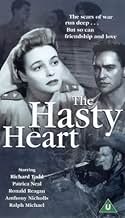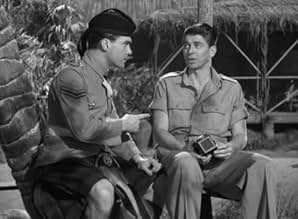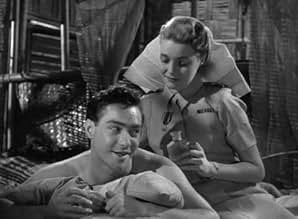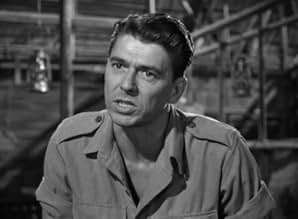IMDb RATING
7.3/10
1.6K
YOUR RATING
In the final days of WW2, in a M.A.S.H. unit in Burma, a seriously wounded corporal watches in dismay as fellow soldiers pack-up to return home but a caring nurse and five remaining soldiers... Read allIn the final days of WW2, in a M.A.S.H. unit in Burma, a seriously wounded corporal watches in dismay as fellow soldiers pack-up to return home but a caring nurse and five remaining soldiers bring him solace.In the final days of WW2, in a M.A.S.H. unit in Burma, a seriously wounded corporal watches in dismay as fellow soldiers pack-up to return home but a caring nurse and five remaining soldiers bring him solace.
- Director
- Writers
- Stars
- Nominated for 1 Oscar
- 6 wins & 3 nominations total
Howard Marion-Crawford
- Tommy
- (as Howard Crawford)
Alfie Bass
- Orderly
- (as Alfred Bass)
Robert Douglas
- Narrator
- (voice)
- (uncredited)
Clive Dunn
- MacDougall
- (uncredited)
John Gregson
- Raw Recruit in Jungle
- (uncredited)
Pamela van Dale
- Burmese Woman
- (uncredited)
Ben Williams
- Clerk at Hospital
- (uncredited)
- Director
- Writers
- All cast & crew
- Production, box office & more at IMDbPro
Featured reviews
The Hasty Heart is one of the finest and most sensetive films ever made. Ronald Reagan gives his best acting performance and this story should bring a tear to the most cynical eyes. It is a story about a man with a terminal illness and his battle with self pity. As sad as it is, it is a celebration nevertheless, of the human condition. Its about real people and real feelings, not some hyped up special effects extravaganza of all prop and no plot. Although the film is not religious, per se, and does not mention God, it is a spiritual film, a gut wrenching exercise of the soul.
The Hasty Heart is the second best known work of author John Patrick, his biggest triumph being The Teahouse of the August Moon. It ran on Broadway from early to middle 1945 while there was still very much a war going on in the China-Burma-India Theater for 204 performances. It starred Richard Basehart, Anne Burr and John Lund on stage.
Those same roles were taken by Richard Todd, Patricia Neal, and Ronald Reagan in the screen adaption directed by Vincent Sherman. About the only change that was made was a brief prologue showing exactly how Richard Todd got his injuries. After that the entire film is set in a hospital along the Assam front in that theater.
The Hasty Heart is a story about the wounded Richard Todd who doesn't know that while seemingly recovered he lost a kidney and the other one is irreversibly damaged. He will die within a matter of weeks and nurse Patricia Neal moves him in with some other convalescent soldiers including an American, Ronald Reagan and tells them to be easy with him.
Easier said than done because Todd's a really hard case. He's a bitter angry man, a foundling with no family or friends to speak of which is why they aren't writing him his ticket back home, he's got no one to go back home to.
Richard Todd got his first notice in The Hasty Heart with the American public and during the Fifties he made as many films on this side of the pond as in the United Kingdom. Todd was a real life war hero so in playing this part he brought a wealth of bitter experience among dying men. Todd got an Oscar nomination for Best Actor and his competition included, John Wayne for Sands of Iwo Jima, Kirk Douglas for Champion, and Gregory Peck for Twelve O'Clock High. The eventual winner though was Broderick Crawford in All the King's Men.
Patricia Neal as a young contract player with Warner Brothers also got her first really good part as the compassionate nurse. And a veteran contract player with Warner Brothers who left the movies for another career, Ronald Reagan got some of the best notices of his career. The Hasty Heart is definitely one of the three films most identified with him in a good way, the others being Knute Rockne - All American, and King's Row.
The Hasty Heart is a fine film about the tragedy of war and the worst tragedy of going through life without friends. Make sure to catch it if it's ever broadcast on TCM.
Those same roles were taken by Richard Todd, Patricia Neal, and Ronald Reagan in the screen adaption directed by Vincent Sherman. About the only change that was made was a brief prologue showing exactly how Richard Todd got his injuries. After that the entire film is set in a hospital along the Assam front in that theater.
The Hasty Heart is a story about the wounded Richard Todd who doesn't know that while seemingly recovered he lost a kidney and the other one is irreversibly damaged. He will die within a matter of weeks and nurse Patricia Neal moves him in with some other convalescent soldiers including an American, Ronald Reagan and tells them to be easy with him.
Easier said than done because Todd's a really hard case. He's a bitter angry man, a foundling with no family or friends to speak of which is why they aren't writing him his ticket back home, he's got no one to go back home to.
Richard Todd got his first notice in The Hasty Heart with the American public and during the Fifties he made as many films on this side of the pond as in the United Kingdom. Todd was a real life war hero so in playing this part he brought a wealth of bitter experience among dying men. Todd got an Oscar nomination for Best Actor and his competition included, John Wayne for Sands of Iwo Jima, Kirk Douglas for Champion, and Gregory Peck for Twelve O'Clock High. The eventual winner though was Broderick Crawford in All the King's Men.
Patricia Neal as a young contract player with Warner Brothers also got her first really good part as the compassionate nurse. And a veteran contract player with Warner Brothers who left the movies for another career, Ronald Reagan got some of the best notices of his career. The Hasty Heart is definitely one of the three films most identified with him in a good way, the others being Knute Rockne - All American, and King's Row.
The Hasty Heart is a fine film about the tragedy of war and the worst tragedy of going through life without friends. Make sure to catch it if it's ever broadcast on TCM.
As a fan of neither soap operas nor Ronald Reagan I find myself utterly captivated by the movie of The Hasty Heart, a popular play of the postwar years, which was filmed in England by Warner Brothers. Richard Todd plays Lachy, a proud, somewhat obnoxious Scotsman who is assigned to a Burmese hospital, where he is presumably recovering from surgery but in fact dying, a fact kept from him by the medical staff. The other patients are told to go easy on the fellow, to make friends with him, which they do, with considerable opposition from Lachy himself, who did not up to this time have friends. There is some excellent dialogue along the way, as the various patients and staff members attempt to soften up this hard case, which in the end they do. The acting, of Richard Todd, as Lachy, and Patricia Neal, as the nurse he develops what I guess one would call a crush on, is quite good, but what makes the film somewhat of a revelation is the truly excellent performance of none other than Ronald Reagan, as Yank, the one American among the patients, and nobody's fool. Reagan does not play his part for charm. Yank is in his way as tough as Lachy, only he accepts life and Lachy doesn't. He too has a hard streak, but also compassion; and he is never soft. The interaction between the astringent Yank and everyone else is, thanks to Mr. Reagan, far and above the liveliest part of the film, which depending on one's mood can be either inspiring, in a gentle sort of way, or vaguely depressing, given its subject matter. This is a fine example of a well-made play of the sort its author, John Patrick, was an expert at. One doesn't see too many of them around these days, as they have gone out of fashion, as the art of the drama has, for good or ill, moved on. After seeing this movie one might have second thoughts about the notion that the theatre has, in the last half-century, moved on to better things.
I join others praising this movie. Is it sentimental? Well, yes. Is it simple? Yes. In fact, does the main character seem a little simple? Yes - the acting by Oscar nominated Richard Todd is a bit broad to my taste. (I quite admire Todd - who, in The Longest Day, played virtually the part he played in the real D Day landing; generally Todd is rather stoic and understated in his acting - e.g., D Day: The Sixth of June - not so here).
Still, there is something about this movie that really grabs you - like say, The Fantasticks - simple, yet quite true, very humane and in its own way, powerful.
Reagan is his usual fine self - I think always underrated as an actor - e.g., see his smallish part in Bette Davis' Dark Victory (he's a lazy society swell). Patricia Neal is the sort of woman you DO fall for.
The fact that they do not sugarcoat the ending - we know the future will be grim, is to the movie's benefit. These were dark days - all these men had been through the Depression, had been in a vicious War in Burma for years, had seen, and caused others, death many many times. They're far more matter of fact about death than any contemporary movie would make its characters -"oh, too bad, a bad break" is the comment. The acceptance of this grim reality made me think about the resilience of people and the stoicism of that generation.
Do see it- it's a wonderful simple tearjerker that you won't forget.
Still, there is something about this movie that really grabs you - like say, The Fantasticks - simple, yet quite true, very humane and in its own way, powerful.
Reagan is his usual fine self - I think always underrated as an actor - e.g., see his smallish part in Bette Davis' Dark Victory (he's a lazy society swell). Patricia Neal is the sort of woman you DO fall for.
The fact that they do not sugarcoat the ending - we know the future will be grim, is to the movie's benefit. These were dark days - all these men had been through the Depression, had been in a vicious War in Burma for years, had seen, and caused others, death many many times. They're far more matter of fact about death than any contemporary movie would make its characters -"oh, too bad, a bad break" is the comment. The acceptance of this grim reality made me think about the resilience of people and the stoicism of that generation.
Do see it- it's a wonderful simple tearjerker that you won't forget.
My diary records my varying impressions of this film:
1985
A young man doesn't know he is dying. He doesn't appreciate people. His friends know his fate and try to be kind, but he rejects them. They don't give up, and he mellows a little. But then he finds out he is dying and that they knew. He interprets their kindness as mere pity, is outraged and prepares to die alone. However a man who doesn't speak English, and therefore doesn't know he is dying gives him a gift, and convinces him that there is genuine friendship in this world. The movie is gimmicky and contrived, like a dramatized sermon, but it is one of the better films ever made.
1986
This time I wasn't tearful. I found it rather preachy. The writer should have written a short essay rather than bore us with a contrived plot.
1998
I loved it just as much as when I first saw it. The critics, true to form, despised its "sentimentality", yet it is an exceptionally lucid, warm and wonderful play, Reagan's best and most humane role.
2000
One of my most favorite movies. It focuses your attention on what is valuable in life, stripping away pride. We all have a very limited time, and appreciation and gratitude is in order. The real subject of the film however, is faith in mankind. The bitter man's faith has been shattered by the war. Yet he learns that however murky and ignoble people's motives may be, one must cherish every morsel of kindness one can get or give. (Although solitude is not that bad either!!!) Profoundly wise and moving!
1985
A young man doesn't know he is dying. He doesn't appreciate people. His friends know his fate and try to be kind, but he rejects them. They don't give up, and he mellows a little. But then he finds out he is dying and that they knew. He interprets their kindness as mere pity, is outraged and prepares to die alone. However a man who doesn't speak English, and therefore doesn't know he is dying gives him a gift, and convinces him that there is genuine friendship in this world. The movie is gimmicky and contrived, like a dramatized sermon, but it is one of the better films ever made.
1986
This time I wasn't tearful. I found it rather preachy. The writer should have written a short essay rather than bore us with a contrived plot.
1998
I loved it just as much as when I first saw it. The critics, true to form, despised its "sentimentality", yet it is an exceptionally lucid, warm and wonderful play, Reagan's best and most humane role.
2000
One of my most favorite movies. It focuses your attention on what is valuable in life, stripping away pride. We all have a very limited time, and appreciation and gratitude is in order. The real subject of the film however, is faith in mankind. The bitter man's faith has been shattered by the war. Yet he learns that however murky and ignoble people's motives may be, one must cherish every morsel of kindness one can get or give. (Although solitude is not that bad either!!!) Profoundly wise and moving!
Did you know
- TriviaWhen Lachie asks Yank what he's going to do after the war, Yank replies that he's going back to "...a little place on the Rock River, Dixon, Illinois." This is actor Ronald Reagan's actual boyhood home.
- Quotes
Sister Parker: He's a foundling, his father left his mother before he was born. Do you know what that means?
Yank: He sure is!
- ConnectionsFeatured in Elstree Story (1952)
- How long is The Hasty Heart?Powered by Alexa
Details
- Release date
- Country of origin
- Language
- Also known as
- Hasty Heart
- Filming locations
- Elstree Studios, Borehamwood, Hertfordshire, England, UK(studio: made at Elstree Studios, London, England.)
- Production companies
- See more company credits at IMDbPro
- Runtime1 hour 42 minutes
- Color
- Aspect ratio
- 1.37 : 1
Contribute to this page
Suggest an edit or add missing content






















